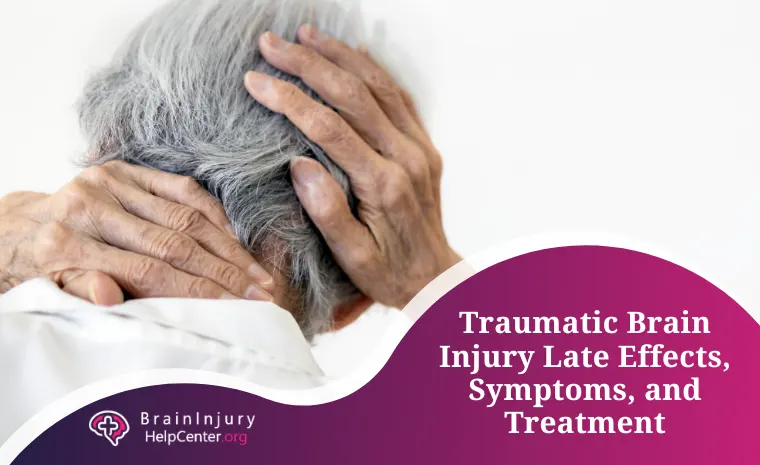Traumatic Brain Injury Late Effects, Symptoms, and Treatment
Traumatic Brain Injury (TBI) is a severe and potentially life-altering condition that occurs when the brain experiences a sudden and forceful impact. This can result from a wide range of incidents, including falls, car accidents, sports injuries, or physical assault. The consequences of TBI can be significant, affecting various aspects of an individual’s physical, cognitive, and emotional well-being.
Let’s explore traumatic brain injury late effects, the common symptoms that may arise, and the various treatment options available. Our goal is to provide valuable information and insights to individuals, families, caregivers, and medical professionals who are dealing with or seeking more information about TBI.
What is Traumatic Brain Injury?
TBI refers to damage caused to the brain due to an external force. It can occur as a result of a direct blow to the head, a rapid acceleration or deceleration of the head, or penetrating injuries.
When a traumatic event occurs, such as a severe blow to the head, the brain can experience various types of injuries affecting the cerebrospinal fluid (CSF) and the frontal lobes.
CSF is a clear, colorless fluid that surrounds and protects the brain and spinal cord. It acts as a cushion, absorbing shocks and protecting the brain from external forces. In the case of a TBI, the impact can cause the brain to move forcefully within the skull. The disruption can lead to alterations in CSF flow, production, or absorption.
The frontal lobes, located at the front of each cerebral hemisphere, are also vulnerable to traumatic brain injuries. They play a crucial role in many higher cognitive functions, including reasoning, decision-making, problem-solving, attention, and social behavior.
In a TBI, the frontal lobes, due to their position near the front, often bear the brunt of the impact. This can result in changes in personality, behavior, and social interactions.
Another significant characteristic of TBI is diffuse axonal injury (DAI). The axons in the brain’s white matter become susceptible to damage caused by the mechanical forces experienced during TBI, later leading to persistent loss of consciousness.
Suffering from brain injury due to an accident?
Causes of Traumatic Brain Injury
TBI can occur through various mechanisms of injury. Falls, particularly among the elderly and young children, are one. Motor vehicle accidents can also lead to head injuries.
High-impact sports such as football, soccer, and boxing pose a risk of TBI due to the high likelihood of collisions and blows to the head. Acts of violence, including physical assaults, gunshot wounds, and incidents of domestic abuse, can result in TBI. Military personnel or those affected by industrial accidents often report brain injury.
Common Symptoms of Traumatic Brain Injury
The symptoms of TBI can vary depending on the severity of the injury. Common symptoms include:
- Headaches and migraines
- Nausea and vomiting
- Loss or decreased level of consciousness
- Memory loss and confusion
- Dizziness and balance issues
- Sensory changes, such as blurred/double vision, or ringing in the ears
- Mood swings and irritability
- Difficulty sleeping
- Fatigue and lack of energy
- Seizures
Immediate Medical Care for TBI
When an individual suffers a head injury, it is essential to seek prompt medical attention, as even seemingly mild injuries can have hidden complications. The medical care for TBI typically involves a comprehensive approach.
It begins with a thorough physical examination and assessment of TBI symptoms. Healthcare providers may also order imaging tests, such as computerized tomography (CT) scans or magnetic resonance imaging (MRI), to evaluate the damage to the brain.
Additionally, they will closely monitor the patient for any signs of increased intracranial pressure, which can be a serious complication. Medications may be prescribed to manage pain and prevent further damage.
In severe cases, surgery might be necessary to alleviate pressure on the brain. Seeking immediate medical attention and following the recommended treatment plan is crucial for maximizing recovery and minimizing potential long-term effects of TBI.
Early Effects of TBI
In the short term, individuals with TBI may experience various effects, including:
- Physical impairments like paralysis, muscle weakness, or coordination difficulties
- Communication and language difficulties
- Cognitive impairments, such as memory problems, attention deficits, and difficulty concentrating
- Sensory changes, including vision or hearing problems
- Emotional and behavioral changes, such as mood swings, anxiety, or depression
Late Effects of TBI
While many individuals recover within a few weeks or months, others may experience traumatic brain injury late effects. These late effects of TBI can significantly impact their quality of life:
Cognitive and Behavioral Changes
- Memory and attention problems may persist, affecting daily functioning
- Difficulty with decision-making and problem-solving
- Behavioral changes like impulsivity, irritability, or lack of emotional control
- Sleep disorders like insomnia
Physical Impairments
- Chronic pain, headaches, and migraines
- Balance and coordination problems
- Fatigue and weakness in the limbs
Emotional and Psychological Effects
- Increased risk of developing mental health conditions like anxiety and depression
- Social withdrawal and difficulties in maintaining relationships
- Emotional instability and mood swings

Treatment Options for Traumatic Brain Injury
Treating severe brain injury involves a multidisciplinary approach tailored to the individual’s specific needs. Treatment may include:
Rehabilitation and Therapy
- Physical therapy to improve motor skills and regain strength
- Occupational therapy to relearn daily activities and improve cognitive functions
- Speech and language therapy to address communication difficulties
Medications for Traumatic Brain Injury
- Medications to manage pain, reduce seizures, or control mood disorders
- Cognitive enhancers to improve memory and cognitive abilities
Assistive Devices and Supportive Services
- Assistive devices like wheelchairs or walking aids for impairments such as blurred vision or weakness
- Supportive services like vocational rehabilitation or counseling for emotional well-being
Coping Strategies and Support for Traumatic Brain Injury Survivors
Living with the effects of severe head injury can be challenging, both for individuals and their families. Here are some coping strategies and support mechanisms:
- Build a strong support network of friends, family, and professionals.
- Engage in cognitive exercises and memory enhancement techniques.
- Participate in support groups or counseling sessions.
- Set realistic goals and celebrate small victories.
- Practice self-care and maintain a healthy lifestyle.
FAQs on Traumatic Brain Injury Late Effects
How long does it take to recover from Traumatic Brain Injury?
The recovery time varies depending on the severity of the injury. Mild cases may recover within a few weeks, while severe cases can take months or even years.
Can TBI lead to dementia?
While TBI itself doesn’t directly cause dementia, severe or repeated injuries may increase the risk of developing neurodegenerative disorders like Alzheimer’s disease later in life.
Are there any preventive measures for TBI?
Wearing appropriate safety gear, such as helmets during sports or seat belts in vehicles, can significantly reduce the risk of TBI. Taking precautions to prevent falls, especially for older adults, is also important.
Can children recover better from TBI than adults?
Children’s brains are more adaptable and resilient, often showing better recovery outcomes compared to adults. However, the severity of the injury and individual circumstances play a significant role in the recovery process.
How can family members support a loved one with traumatic brain injury?
Family members can provide emotional support, assist with daily activities, and encourage participation in rehabilitation programs. Education about TBI and its effects can help them understand and communicate effectively with their loved one.
We Can Help
Traumatic brain injury can profoundly impact individuals’ lives, leaving lasting effects. It is crucial to have a thorough understanding of these traumatic brain injury late effects, their symptoms, causes, and available treatment options to enable early intervention and promote optimal recovery. By offering proper medical care, rehabilitation, and support, we can assist TBI survivors in reclaiming their independence and enhancing their overall quality of life.
We can also help you through your personal injury claims from a TBI diagnosis from an accident or assault. Note, however, that establishing the extent of the injury and accurate accounting for future medical care are vital factors that can significantly impact the value of a settlement.
Medical evaluations, including diagnostic tests and assessments by doctors, to assess cognitive impairments, physical limitations, and emotional impact, can strengthen your claim.
Considering future medical care requirements, such as ongoing therapies, rehabilitation, and medication, helps ensure that the settlement also accounts for the long-term financial implications of the injury, potentially increasing its value to provide maximum compensation for the victim’s future needs.
You do not have to do all of these on your own.
The Brain Injury Help Center in California is dedicated to offering support, information, and aid to individuals with traumatic brain injuries (TBI) and their families who require assistance.
Whether you are dealing with the complexities of a TBI or navigating insurance claims following an accident, we have the necessary resources and expertise to help you.
Do not hesitate to contact us at (866) 576-0936 for a free consultation.









